Psychology is one of the most thrilling subjects to be learned as the topics concern the human mind and its behavior. Films approach these ideas very imaginatively and entertainingly. Future psychologists will be able to view these films dealing with different questions spanning the field, especially mental disorders, therapy, and social behavior. Such exposure would certainly broaden their horizons and enthuse their curiosity. Here is a list of 17 film recommendations for those with a passion for psychology and wish to see the concepts in action on the silver screen.
17) The Machinist (2004)

The 2004 movie The Machinist, is a compelling film and a must-watch for Psychology majors as it delves into the mind of the title character Trevor Reznik, portrayed by Christian Bale. Bale's Reznik struggles with insomnia, paranoia, and hallucinations. The storyline revolves around Reznik's disintegrating psyche, and how it takes a toll on his physical health. Directed by Brad Anderson, the movie explores themes of insomnia, guilt, and mental illness.
16) Matchstick Men (2003)
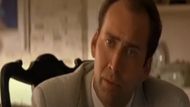
Matchstick Men is a great pick for Psychology majors as it follows the story of a con artist, Roy Waller, played by Nicholas Cage, and his daily struggle with OCD and Tourette syndrome. It further demonstrates how Roy's condition affects practically every aspect of his life, covering everything from his work down to his relationships. As the story goes along, one observes even deeper symptoms of OCD, such as compulsive reactions and obsessive thoughts. It also emphasizes how past traumas can manifest themselves in some way through mental health issues.
15) Awakenings (1990)

Awakenings, a film made in 1990, serves as a very good source material for students of psychology because this film tells the true story of Dr. Oliver Sacks's works with catatonic patients, through a fictional character Dr. Malcolm Sayer ( Robin Williams). Based on the book of the same name, the film traces the introduction of a new medication called L-Dopa, which is administered to raise patients from deep vegetative states, often after decades of inactivity. The film touches on the complex aspects of neurological disorders and the ethical dilemmas in experimental treatments, as well as the emotional trauma on both the patients and their caregivers.
14) We Need to Talk About Kevin (2011)

We Need To Talk About Kevin is an important film for psychology majors because it delves into the complex dynamics between a mother and her troubled son. Based on Lionel Shrivel's novel of the same name, the film focuses on the psychological aspects of parenting, the nature versus nurture debate, and the development of antisocial behavior. Kevin ( Ezra Miller), the son, displays disturbing behavior from a young age, and the film explores his mother's (Tilda Swinton) struggle to understand and cope with his actions.
13) Rain Man (1988)

The film Rain Man is an interesting film for psychology major students. It portrays the relationship between two brothers- Charlie Babbitt ( Tom Cruise) and Raymond Babbitt ( Dustin Hoffman) who is autistic and has savant syndrome. Directed by Barry Levinson, the brothers' relationship is examined, including how they come to understand and support one another. It also highlights the characteristics of autism, such as difficulties with social interactions and repetitive behaviors, as well as the extraordinary abilities that can sometimes accompany the condition.
12) The Stanford Prison Experiment (2015)
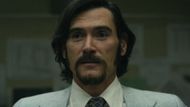
The Stanford Prison Experiment is an essential film for psychology majors because it dramatizes a real-life psychological study conducted in 1971 by Dr. Philip Zimbardo, a psychologist and professor at Stanford University. The film explores how ordinary people can be influenced by their roles and environments to behave in extreme ways. In the docudrama film, students of Stanford are assigned roles as guards or prisoners in a simulated prison set up by Billy Crudup's Dr. Zimbardo. The movie shows how quickly the guards become abusive and the prisoners become submissive, highlighting the power of authority and situational factors in shaping behavior.
11) 28 Days (2000)

28 Days is a great addition to this list because it explores the journey of recovery from addiction. Directed by Betty Thomas, the film follows Sandra Bullock's Gwen Cummings, a newspaper columnist who has to go into rehab for 28 days due to her reckless behavior under the influence of alcoholism. The film provides a realistic portrayal of the challenges faced by individuals struggling with addiction, including denial, relapse, and the process of healing.
10) Good Will Hunting (1997)

The 1997 film, Good Will Hunting, delves deeper into the themes of trauma, therapy, and personal growth. Directed by Gus Van Sant, the film focuses on the story of Matt Damon's Will Hunting, who works as a janitor at MIT and is exceptionally great in mathematics. However, he struggles with emotional issues and past trauma. As he begins therapy with Robin Williams' Dr. Sean Maguire, he starts confronting his issues and comes to terms with them, highlighting the process of therapy and its effects on human beings.
9) Memento (2000)
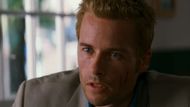
Memento explores the effects of short-term memory loss on the titular character, Leonard Shelby, played by Guy Pierce. Directed by Christopher Nolan, the movie is based on his brother, Jonathan Nolan's short story, Memento Mori. The film's unique narrative structure, told in reverse, mirrors Leonard's experience of living with anterograde amnesia, where he can't form new memories. Viewers get a close look at how this condition affects his ability to make decisions, trust people, and understand his reality.
8) Shutter Island (2010)
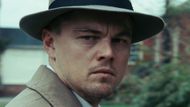
The 2010 film, Shutter Island follows the story of U.S. Marshal Teddy Daniels, played by Leonardo Dicaprio, who is investigating a psychiatric facility on Shutter Island. The Martin Scorsese film explores themes of delusion, trauma, and the nature of reality. As Dicaprio's Teddy uncovers more about the facility and his own past, viewers get a close look at how severe psychological trauma can lead to delusions and altered perceptions of reality.
7) Inside Out (2015)

Inside Out is a film that explores the human mind and emotions such as Sadness, Joy, Fear, Anger, and Disgust creatively and engagingly. The movie provides a visual and engaging way to understand how emotions influence behavior, decision-making, and memory. It highlights the importance of emotional balance, the role of each emotion, and how they work together to shape our experiences.
6) 12 Angry Men (1957)
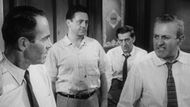
The 1957 courtroom drama, 12 Angry Men, delves into the themes of group dynamics, social influence, and decision-making. Directed by the renowned director, Sidney Lumet, the film follows a group of jurors who have to decide the fate of a young man. As the jurors discuss their opinions, viewers see how personal biases, group pressure, and moral reasoning affect their decisions.
5) Requiem for a Dream (2000)

Requiem For A Dream highlights the effect addiction has on an individual and their relationships. The film is based on Hubert Selby Jr.'s novel of the same name. The Darren Aronofsky film follows several drug addicts and how their addiction has impacted their lives by blurring the lines between reality and delusion. It provides a raw and unflinching look at the physical, psychological, and emotional toll of addiction.
4) Silver Linings Playbook (2012)
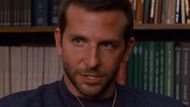
Based on Matthew Quick's novel of the same name, Silver Linings Playbook highlights mental health issues and the stigma around it. The David O Russell movie follows Bradley Cooper's Patrizio Solitano, who has bipolar disorder and is trying to improve his life through the support of Jennifer Lawrance's Tiffany Maxwell, who is suffering from an unnamed mental issue. It shows the importance of support, therapy, and finding healthy coping mechanisms.
3) Eternal Sunshine of the Spotless Mind (2004)
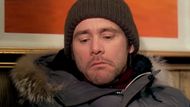
Directed by Michael Gondry, Eternal Sunshine Of The Spotless Mind, tells the story of Joel ( Jim Carrey) and Clementine ( Kate Winslet), who agree to do a procedure to erase each other from their memories after their relationship ends. The film delves into the complexities of memory and the emotional impact of erasing painful experiences. It highlights the importance of memories in shaping who we are and how we connect with others.
2) One Flew Over the Cuckoo's Nest (1975)

The Milos Foreman film, One Flew Over The Cuckoo's Nest, is a must-watch for psychology students as it delves deeper into the world of mental health institutions and patient care. The film is set in a psychiatric hospital and follows the story of Randle McMurphy, played by Jack Nicholson, a new patient who challenges the oppressive rules enforced by Nurse Mildred Ratched ( Louise Fletcher). Based on Ken Kesey's novel of the same name, the movie highlights the struggles of patients, the impact of institutionalization, and the ethical issues in psychiatric care.
1) A Beautiful Mind (2001)
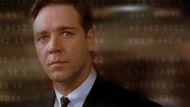
Ron Howard's film, A Beautiful Mind, follows the story of Nobel Laureate John Nash and his struggle with mental illness. Based on Sylvia Nasar's biography of the brilliant mathematician, the movie follows John Nash, played by Russell Crowe, and how he manages his life and career amidst the symptoms of schizophrenia. It also highlights the importance of support from loved ones and medical professionals.
Love movies? Try our Box Office Game and Movie Grid Game to test your film knowledge and have some fun!

